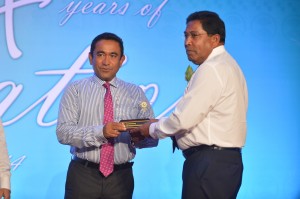Foreign investments pose no threat to either Islam or Maldivian independence and sovereignty, President Abdulla Yameen said last night, assuring that the creation of special economic zones (SEZs) was no cause for concern.
“It does not mean casinos will be operated in the Maldives, and it does not mean the president would have more power than he should,” Yameen said in a speech at a function held by the Maldives Inland Revenue Authority (MIRA) to celebrate its fourth anniversary.
Yameen insisted that foreign investments would be fully subject to Maldivian law while sovereignty would extend to the SEZs.
The government’s flagship SEZ legislation – which envisions free trade zones with relaxed regulations and tax incentives – has come under fire from the opposition with former President Mohamed Nasheed contending that the zones would be used for criminal enterprises, “irreligious” activities such as gambling, and money laundering.
The opposition leader had dubbed the legislation the ‘Artur Brothers bill’, referring to an infamous pair of Armenians linked with money laundering and drug trafficking who made headlines last year after they were photographed with cabinet ministers.
Nasheed had also argued that the government would have less authority in the SEZs than the authority it exercised in Addu Atoll Gan Island during British occupation.
Corruption
 Briefing MPs on parliament’s economic affairs committee yesterday – which is reviewing the SEZ bill – MP Mohamed ‘Kutti’ Nasheed reportedly sought to allay fears that SEZs would facilitate corruption.
Briefing MPs on parliament’s economic affairs committee yesterday – which is reviewing the SEZ bill – MP Mohamed ‘Kutti’ Nasheed reportedly sought to allay fears that SEZs would facilitate corruption.
The ruling Progressive Party of Maldives MP – who was involved in drafting the legislation – explained that the bill includes mechanisms to prevent corruption and take legal action in accordance with the UN International Convention against Corruption.
Provisions were included for terminating agreements with investors if an act of corruption is proved, he added.
Nasheed also suggested that other issues such as a ceiling for investments and extending incentives to developers in addition to investors could be addressed at the committee stage.
Speaking at the committee, Jumhooree Party Leader Gasim Ibrahim expressed concern with the legislation conferring excessive authority to the president, which he warned could be used to favour or “destroy” businesses.
The absence of a ceiling limit for investments was a threat to existing enterprises, Gasim argued, as the president could “take some dollars and create economic zones to enrich three or four people.”
The business tycoon, however, said he supports passing the bill with revisions.
MP Ahmed Siyam Mohamed – owner of the ‘Sun Siyam Resorts’ and leader of the government-aligned Maldives Development Alliance – urged expediting the passage of the bill as an SEZ law would allow “stalled investments” to resume.
Foreign banks were not lending for investments in the country at present, Siyam said, but development banks would be established along with the SEZs.
The economic committee’s chair said last week that he expects the review process to be completed before the end of the month, after which the bill would be sent to the Majlis floor for a vote.
New frontiers
Yameen meanwhile said last night that the Maldives should emerge from its “small crab hole” into the wider world.
The government’s efforts to generate income to create job opportunities and provide education and healthcare was “not a big ask,” he said.
The country should have the courage and capacity to forge ahead, he added, and “face new things.”
The government’s efforts were geared towards “economic transformation” through diversification and fostering a “business-friendly environment” for both domestic and foreign entrepreneurs.
While increasing tourist arrivals was “natural economic growth,” Yameen explained that the objective was to “transform” the economy from the present “production frontier” to a higher level.
The “main beneficiary” from economic diversification and ‘mega projects’ would be the state, Yameen added, as tax revenue would increase and job opportunities would be created.
The Ibrahim Nasir International Airport currently caters for about 1.5 million passengers, he continued, but the government’s target was developing the airport to serve “five to seven million passengers.”
Implementation of the mega projects – such as the ‘iHavan’ transhipment port – would “transform the economic landscape,” Yameen suggested.
The government was also reviewing framework agreements for “avoidance of double taxation” to ensure that “corporate leaders” from neighbouring countries with investments in the Maldives are not taxed twice, Yameen revealed.
While the government’s focus was on the economy instead of partisan politics, Yameen stressed that political stability and a low crime rate were among the “basic ingredients” for economic transformation.
Reiterating the government’s focus on youth development, Yameen said the Maldives needed to move away from a culture of “criminalisation” of trivial offences to encouraging youth and “giving them conviction” and employment opportunities.
The younger generation was “the energy of the economy,” he added.
In a speech earlier this month, Yameen point to the country’s “motivated”, “highly intelligent” and “easily trainable” youth as a key resource for economic growth.
Likes (5)Dislikes
(5)Dislikes (0)
(0) 
